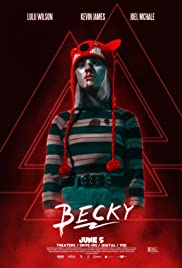
BECKY
US, 2020, 93 minutes, Colour.
Lulu Wilson, Kevin James, Joel Mc Hale, Robert Maillet, Amanda Brugel, Isaiah Rockcliffe, Ryan Mc Donald, James Mc Dougall.
Directed by Jonathan Millot, Cary Murnion.
Becky sounds rather a folksy title. But, her film is not folksy at all. It is a variation on the not unfamiliar theme of home invasion, brutal criminals menacing a family, the family resisting.
On that level, the film works. We are introduced to Becky being interviewed by police and a social worker – only to find that the action of the film is a flashback from that interview. Becky is 13, is upset, looks on her phone at images of her mother dying in hospital and Becky’s complete devotion to her. She is upset with her father, thinking he is not grieving enough, especially when he brings home a fiancee who has a little boy. Becky acts up, walks out from the meal with her two dogs, going to a hut in the bush.
The film has a parallel as it opens, a group of convicts bullying and brutalising a man in prison, intercut with the bullying of Becky at school. It certainly raises an atmosphere – making a theme of the underdog rebelling against the bullies. The prisoners escaped from a van, put on police uniforms, commandeer a car (glimpses of bloodshed) and drive to the house where Becky lives. Becky will overcome.
The action of the home invasion is, at first, what we would expect, confrontation with the father, tying up the mother and son, brutal towards some of the dogs, assuming at first that Becky was a dog but then finding who she really was.
And, then, the confrontations.
For audiences who might be in for a home invasion thriller, it needs to be said that the confrontations, some close-ups of torture of the father, the pursuit of Becky, becomes more and more vivid – and prolonged. The eventual sequences where Becky uses her wits, turning the tables on the criminals, become more and more brutal, some brutally shocking moments, and Becky on a rampage.
One of the puzzles of the film is the casting of Kevin James as the neo-Nazi brotherhood chief criminal. In some ways he is his comic pudgy self. On the other hand, shaved head, swastika tattooed on top, big beard, ruthless, this is not the comedian, Kevin James, that we are used to.
The question is how much do the writers and the two directors want the the audience to identify with Becky and to share, not just her courage and wit, but the vindictive brutality that she displays to defend herself and her family.